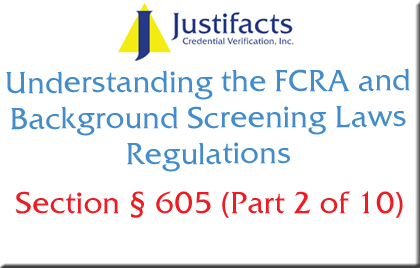Part 2: Section § 605. Requirements Relating to Information Contained in Consumer Reports

Part two of our ten-part series deals with information that must be excluded from Consumer Reports (i.e. background checks).
If this is your first time viewing this series, you may want to read the previous entry:
Intro to Understanding the FCRA and Background Screening Laws & Regulations
Part 1: Section § 604. Permissible Purposes of Consumer Reports
Section § 605. Requirements Relating to Information Contained in Consumer Reports
Except as exempted by this section, no consumer reporting agency may make any consumer report containing any of the following items of information:
1. Cases under title 11 [United States Code] or under the Bankruptcy Act that, from the date of entry of the order for relief or the date of adjudication that are ten years older than the report.
2. Civil suits, civil judgments, and records of arrest that are seven years older than the report or until the governing statute of limitations have expired. Whichever situation is the longer period?
3. Paid tax liens which, from the date of payment, are seven years older than the report
4. Accounts placed for collection or charged to profit and loss which are seven years older than the report
5. Any other adverse item of information, other than the records of conviction of crimes which are seven years older than the report.
Exempted cases
1. A credit transaction involving, or which may reasonably be expected to involve, a principal amount of $150,000 or more.
2. The underwriting of life insurance involving, or which may reasonably be expected to involve, a face amount of $150,000 or more.
3. The employment of any individual at an annual salary which equals, or which may reasonably be expected to equal $75,000, or more.
In Conclusion
employers should be aware that are certain occasions. An individual may have adverse information in their history that is not reportable. The FCRA protects consumers or applicants from having outdated information used against them.
Next: Part 3: Section § 606. Disclosure of investigative consumer reports
It is important to note that Justifacts is providing this information as a service to our clients. None of the information contained herein should be construed as legal advice, nor is Justifacts engaged to provide legal advice. We go to great lengths to make sure our information is accurate and useful. We recommend you consult your attorney or legal department if you want assurance that our information, and your interpretation of it, is appropriate to your particular situation.
Subscribe to our email list to be alerted of our next blog post: |
|---|
|
|




